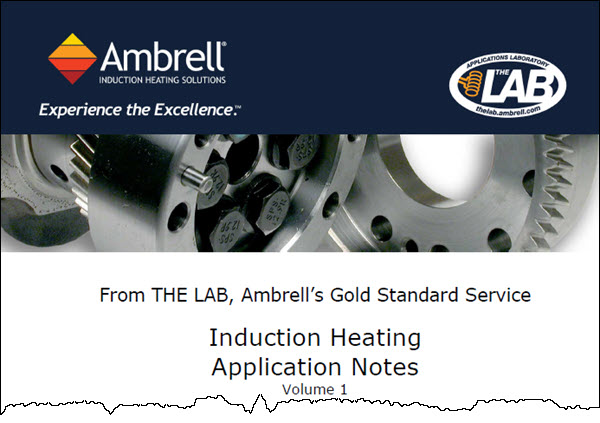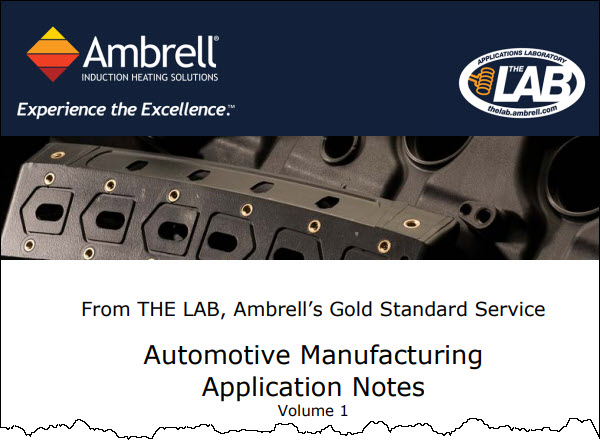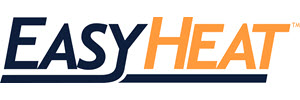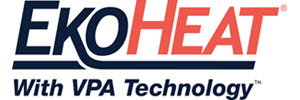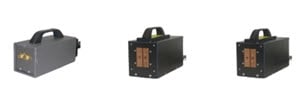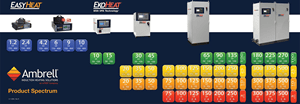Induction in Automotive Manufacturing
- Home
- Process Applications
- Automotive Applications
How is induction heating used in automotive manufacturing?
For decades, Ambrell has been partnering with the world’s largest automotive OEMs, integrators and Tier 1 and 2 suppliers to deliver superior induction heating solutions.
Induction generates an electromagnetic field in a work coil that induces currents in the conductive material of a workpiece placed within or near the coil. Friction from these currents elevates the temperature of the workpieces to be heated.
Benefits of Induction in Automotive Manufacturing
Process repeatability, accuracy, energy efficiency and speed are four hallmarks of induction heating for virtually any application. Additionally, induction heating delivers heat to the targeted part, not the atmosphere around it, so there is no risk of distortion.
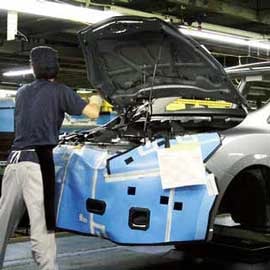
Select an option below:
automotive manufacturing Application Notes
Select from our collection of automotive manufacturing notes, developed over 39 years supporting our customers. Read how we helped to solve their process heating challenges!
 Preheating Steel Tubes Prior to Bonding
Preheating Steel Tubes Prior to Bonding
To heat steels tubes for a bonding application; the end product is a bushing for large trucks. Induction would replace an oven for this client.
 Preheating Rod Assemblies for Welding
Preheating Rod Assemblies for Welding
The client had been using torches for preheating. However, due to process improvements thanks to new automation in their facility, torch heating became too slow. This resulted in a backlog that kept them from maximizing their throughput.
 Induction Preheating Steel Laminate Parts
Induction Preheating Steel Laminate Parts
The c-lams are inserts for an automotive industry application. In production the robotic pick-and-place will occur for plastic overmolding after heating by induction.
 Heating Automotive Battery Cables for Adhesive Melting
Heating Automotive Battery Cables for Adhesive Melting
Temperature indicating paint was applied to the parts, and it took 10 seconds to heat the various styles of the part to the targeted temperature. This testing achieved the client's time and quality objectives.
 Braze a Copper Tube and Brass Fitting
Braze a Copper Tube and Brass Fitting
How to braze copper using a custom-designed single position multi-turn helical coil built to generate the required heating for the copper brazing application.
 Brazing aluminum adaptors to aluminum tubes
Brazing aluminum adaptors to aluminum tubes
To increase production, a multi-position coil was recommended so multiple parts could be heated while maintaining a cycle time of 55 seconds, delivering consistent joint quality, which a torch often doesn't deliver.
 Brazing steel flange and shaft
Brazing steel flange and shaft
Induction brazing is a repeatable process that isn't as labor intensive as a flame often is. The process can heat the assembly rapidly and more energy-efficiently than a torch without the safety risks that come with an open flame
 Brazing a steel tube and fitting (automotive valve)
Brazing a steel tube and fitting (automotive valve)
Customer's client was unhappy with the results from MIG welding, which drove them to look at induction as an alternative process. Induction heating proved to be a fast, repeatable heating method for the application...
 Induction preheating a steel automotive transaxle (welding)
Induction preheating a steel automotive transaxle (welding)
The steel axle was painted with temperature indicating paint and a thermocouple was attached to the part.
 Soldering a pair of magnetic steel pins
Soldering a pair of magnetic steel pins
Soldering with induction required under 10 seconds and is a highly repeatable process; the customer can expect the same result every time with only the portion of the part requiring heating being heated.
 Soldering a rivet onto a steel tank cap with induction heating
Soldering a rivet onto a steel tank cap with induction heating
Soldering with induction proved faster than the client's previous heating torch process. It is also is a repeatable heating process, so the client gets superior results and is more energy efficient than torch heating.
 Soldering brass and steel radiator caps
Soldering brass and steel radiator caps
The induction soldering process is completed within 15 seconds with consistent results without the use of flame, creating a safer, cooler working environment...
 Heating lead battery terminal for removal (recycling)
Heating lead battery terminal for removal (recycling)
A single turn helical coil is used for this heating application. The lead terminal is placed inside the coil and is heated for 20 seconds.
![image: Soldering a copper wire, contactor assembly [motor]](https://www.ambrell.com/hs-fs/hubfs/ambrell-images/Applications/Thumbs/soldering_45.jpg?width=95&height=95&name=soldering_45.jpg) Soldering a copper wire, contactor assembly [motor]
Soldering a copper wire, contactor assembly [motor]
High intensity heat must be applied to the joint area for this application so that thermal conduction of the copper does not sink away the heat delivered from the induction process.
 Heat a compacted litz wire bundle for stripping
Heat a compacted litz wire bundle for stripping
A three turn helical coil is used for the wire stripping process. The litz wire bundle is placed in the coil for 3 seconds to strip the lacquer 0.75 (19mm) from the end of the bundle. The wire bundle is then scraped with a metal brush to remove the burnt lacquer...
 Heat aluminum for brazing an automotive assembly
Heat aluminum for brazing an automotive assembly
A multi turn pancake coil is used to heat the joint between the aluminum tubing and boss. The joint heats to temperature in 1.5 minutes and the braze ring melts forming a clean brazed joint.
 Brazing automotive tube assemblies
Brazing automotive tube assemblies
A four turn split helical coil is used to heat the steel assembly to 1400°F (760°C) for 85 seconds. The coil design allows for the steel fitting to expand away from the steel tube which allows braze to flow through the joint.
 Shrink Fitting Magnetic Steel Pistons
Shrink Fitting Magnetic Steel Pistons
Using induction for shrink-fitting magnetic steel pistons onto a chrome shaft; the client was using an unreliable handheld induction system and wanted a higher quality induction shrink-fitting solution.
 Heating a motor prior to adding an injection molded part
Heating a motor prior to adding an injection molded part
Induction heating enables quicker process times with increased production rates versus a gas-fired oven. Ovens require long heat-up and cool-down times
To heat a coaxial antenna assembly to 600°F within 2 seconds for a soldering application. The goal to improve on an existing procedure with a soldering iron which required 10 to 15 seconds.
Heat multiple joints on solar flex circuit strips to 500°F (260°C) within ten seconds for a soldering application.
 Bonding Steel Wire; Rubber Molding
Bonding Steel Wire; Rubber Molding
To heat steel wire embedded in an automotive rubber molding. Testing from THE LAB confirmed the feasibility of the heating process for the customer.
 Induction Bonding Adhesive to a Steel Washer (Automotive)
Induction Bonding Adhesive to a Steel Washer (Automotive)
Bonding with induction heated a steel washer to the target temperature to enabling adhesive curing; it will be part of an automated process for an automotive industry application
 Shrink fitting an automotive aluminum motor housing
Shrink fitting an automotive aluminum motor housing
Induction shrink-fitting is fast, presents significant energy savings over an electric oven, requires a more modest footprint than an oven and can be easily integrated into an automated process
 Heating steel liners (engine head)
Heating steel liners (engine head)
Precise direct heat to disengage the aluminium quickly and cleanly. The aluminium casing is recycled and reused thereby reducing scrap and cutting costs.
 Induction Bonding Plastic with a Steel Gasket
Induction Bonding Plastic with a Steel Gasket
Induction bonding enables rapid heating, can easily be integrated into the client's manufacturing process due to modest space requirements and delivers a highly repeatable process.
 Metal-to-Plastic Insertion with a Steel Insert
Metal-to-Plastic Insertion with a Steel Insert
The power was turned on for five seconds and the part was monitored during heating and for 15 seconds after.
 Soldering connector to wire harness
Soldering connector to wire harness
Induction heating provides reduced production cost, faster process time, hands-free heating that involves no operator skill for manufacturing
 Shrink Fitting A Gear to a Shaft
Shrink Fitting A Gear to a Shaft
The customer was using a torch, which can lead to inconsistent part quality. Induction's precise heating means the client can count on consistent results in their process
 Shrink Fitting an Aluminum Motor Housing
Shrink Fitting an Aluminum Motor Housing
The customer was using a cold press, but it was creating part defects. This was resolved with induction heating: the process took just two minutes compared to 40 minutes and they were able to achieve their targeted production rate.
 Debonding inserts for manifold
Debonding inserts for manifold
A four-turn two-position helical coil is used to debond the inserts from the plastic. The coil is placed against the manifold and power is applied to the two inserts for 15 seconds to soften the plastic...
 Heat automotive seat springs to powder coat
Heat automotive seat springs to powder coat
Even heating of the spring before dipping provides uniform flow and provides consistent thickness of the nylon coating
 Heating of steel rivet ends (turbines)
Heating of steel rivet ends (turbines)
Heating steel rivets prior to head forming
 Sealing a Nylon Shell for a fuel vapor Assembly
Sealing a Nylon Shell for a fuel vapor Assembly
Filter modules are assembled on the fixture with ring gasket. Pressure is applied to the modules, modules are rotated and induction heating is started. After 10-12 seconds, heating is halted and the modules are removed from the fixture.
A four-turn helical concentrating coil is specially designed to deliver uniform heat to the steel seat belt retraction gear.
 Curing a coating; both sides aluminum piston
Curing a coating; both sides aluminum piston
A three-turn channel coil 19 (48.26cm) long is used to anneal 4 pistons running though the coil with a distance of 6 (15.24cm) between centers.
 Reflowing the solder of an area on a circuit board
Reflowing the solder of an area on a circuit board
An aluminum fixture is a large heat sink to the induction field. In order for solder alloy to wick and run the length of the overlap area, flux is applied to the solder location...
 Bonding Rubber Gaskets to a Steel Gas Intake Manifold
Bonding Rubber Gaskets to a Steel Gas Intake Manifold
Two two-turn pancake coils are specially contoured to the the shape of the steel assembly to produce uniform heat in the gasket areas.
 shrink-fitting a carbide ring into a valve seat
shrink-fitting a carbide ring into a valve seat
A three turn helical coil is used to heat the steel valve seat. The steel valve seat is placed in the coil and heated for 50 seconds to enlarge the center hole & drop the carbide ring in for the shrink-fitting process.
 Heat the end of catalytic converter for weld testing
Heat the end of catalytic converter for weld testing
Heat the end of lorry catalytic converter exhaust system. The assembly must be held at target temperature for 200 hours, whilst the assembly is vibrated to test the weld strength
 Debond rubber seal from steel oil seal ring
Debond rubber seal from steel oil seal ring
Induction heating provides highly accurate, fast, more efficient placement of heat, no effect to surrounding components
 Curing plastisol adhesive on an aluminum filter assembly
Curing plastisol adhesive on an aluminum filter assembly
A four turn helical coil is used to cure the plastisol adhesive. One filter end cap is filled with adhesive, attached to the filter and heated 90 seconds to cure the adhesive.
 Shrink-fitting auto turbo charger impeller blades onto an aluminum shaft
Shrink-fitting auto turbo charger impeller blades onto an aluminum shaft
Induction heating provides repeatable results, reduced cycle time, lower consumables cost and even distribution of heating
 Shrink fitting aluminum pulley to insert inner bearing
Shrink fitting aluminum pulley to insert inner bearing
A three turn helical coil is used to heat the aluminum pulley. The pulley is heated to 464 °F (240 °C) in 20 seconds to expand the inner diameter and then the inner bearing is inserted to form the completed part.
Automotive manufacturers are constantly searching for cost-effective production technologies.
 Inserting a piston stop with o-ring into an oil pump assembly
Inserting a piston stop with o-ring into an oil pump assembly
Induction heating provides increased production speed, simpler tooling for customer, hands-free heating that involves no operator skill for manufacturing
 shrink-fitting an assembled wrist pin into a connecting rod
shrink-fitting an assembled wrist pin into a connecting rod
Induction heating provides more accurate control of heat vs a flame burner, it heats only the knuckle, not the whole part, it prevents discoloring due to lower temperature used and increases productivity due to repeatability & ease of operation. A foot pedal & timer is used.
 Bonding of electric motor shaft to nylon face fan
Bonding of electric motor shaft to nylon face fan
Induction heating provides hands-free heating that involves no operator skill for manufacturing, only the metal shaft is heated so the motor is not affected, increased production due to rapid heating, decreased failure rate, originally used glue which ran into motor and caused failure and stronger bond
 Heating Four Inserts Simultaneously
Heating Four Inserts Simultaneously
The brass inserts are to be heated prior to insertion into a plastic automotive sub assembly
 Case Hardening of Armature Shaft
Case Hardening of Armature Shaft
A five-turn helical coil is used to heat the gear end of the shaft to 1700°F
 Shrink fit a motor shaft and roller
Shrink fit a motor shaft and roller
Processing with induction heat saves power and time. The complete tube does not have to reach the desired temperature as it does when heating with an oven. Being able to selectively heat a zone allows for a much quicker transfer of heat.
Heating is to be accomplished within 5 seconds, and can be done in a helical coil since pick and place manufacturing is employed.
 Bonding Rear View Mirror Brackets to Windshield Glass
Bonding Rear View Mirror Brackets to Windshield Glass
A unique four-over-four double wound pancake coil is used for the bonding application.
 Bonding Automotive Trim Vinyl Covering
Bonding Automotive Trim Vinyl Covering
Heating to 500°F is accomplished through the use of the unique coil; molding is continuously processed at a rate over 20 feet per minute.
 Curing Adhesive on Steel Motor Shaft for Bonding
Curing Adhesive on Steel Motor Shaft for Bonding
A complex two coil system, shield and stud systems used to provide proper axial alignments of the shaft & coil while allowing the fixture to be open for removal of the shaft.
 Pre-heating a Truck Axle Seam for Welding
Pre-heating a Truck Axle Seam for Welding
To pre-heat the seam of a truck axle to over 300°F within 15 seconds for a welding application and maintain temperature within the welding zone
 Heating an Engine Valve Head for Stress Testing
Heating an Engine Valve Head for Stress Testing
To heat the face of an engine valve head to 900°F and maintain the temperature for an extended time, high temperature stress test.
 Brazing Oil Suction Assembly with Copper Ring
Brazing Oil Suction Assembly with Copper Ring
To heat an oil suction assembly (steel tubing and filter cap) to 1,850°F (1010°C) within 15 seconds for a brazing application.
 Shrink Fitting Cam Shaft Gears
Shrink Fitting Cam Shaft Gears
To heat aluminum and steel camshaft gears to over 500°F within 4 minutes for a shrink fitting application.
 Heating Aluminum Auto Trim for Adhesive Curing
Heating Aluminum Auto Trim for Adhesive Curing
To heat various sizes of aluminum auto trim to 500°F (260°C) at a rate of 30 ft. (9.1m) per minute for curing an adhesive.
 Inserting Steel Studs into a Plastic Tail Light
Inserting Steel Studs into a Plastic Tail Light
To heat threaded steel studs for insertion into a plastic tail-light assembly at 450°F.
 Press-Bonding Metal Clips Into Sealers
Press-Bonding Metal Clips Into Sealers
To heat metal clips and press-bond them into rubber seals. The metal needs to be heated to 250°F to 350°F with a cycle time not exceeding 3 seconds
automotive manufacturing Application Notes
Thank you Friend for trusting us with your automotive manufacturing inquiries. Read any of our application notes below without registration.
 Preheating Steel Tubes Prior to Bonding
Preheating Steel Tubes Prior to Bonding
To heat steels tubes for a bonding application; the end product is a bushing for large trucks. Induction would replace an oven for this client.
 Preheating Rod Assemblies for Welding
Preheating Rod Assemblies for Welding
The client had been using torches for preheating. However, due to process improvements thanks to new automation in their facility, torch heating became too slow. This resulted in a backlog that kept them from maximizing their throughput.
 Induction Preheating Steel Laminate Parts
Induction Preheating Steel Laminate Parts
The c-lams are inserts for an automotive industry application. In production the robotic pick-and-place will occur for plastic overmolding after heating by induction.
 Heating Automotive Battery Cables for Adhesive Melting
Heating Automotive Battery Cables for Adhesive Melting
Temperature indicating paint was applied to the parts, and it took 10 seconds to heat the various styles of the part to the targeted temperature. This testing achieved the client's time and quality objectives.
 Braze a Copper Tube and Brass Fitting
Braze a Copper Tube and Brass Fitting
How to braze copper using a custom-designed single position multi-turn helical coil built to generate the required heating for the copper brazing application.
 Brazing aluminum adaptors to aluminum tubes
Brazing aluminum adaptors to aluminum tubes
To increase production, a multi-position coil was recommended so multiple parts could be heated while maintaining a cycle time of 55 seconds, delivering consistent joint quality, which a torch often doesn't deliver.
 Brazing steel flange and shaft
Brazing steel flange and shaft
Induction brazing is a repeatable process that isn't as labor intensive as a flame often is. The process can heat the assembly rapidly and more energy-efficiently than a torch without the safety risks that come with an open flame
 Brazing a steel tube and fitting (automotive valve)
Brazing a steel tube and fitting (automotive valve)
Customer's client was unhappy with the results from MIG welding, which drove them to look at induction as an alternative process. Induction heating proved to be a fast, repeatable heating method for the application...
 Induction preheating a steel automotive transaxle (welding)
Induction preheating a steel automotive transaxle (welding)
The steel axle was painted with temperature indicating paint and a thermocouple was attached to the part.
 Soldering a pair of magnetic steel pins
Soldering a pair of magnetic steel pins
Soldering with induction required under 10 seconds and is a highly repeatable process; the customer can expect the same result every time with only the portion of the part requiring heating being heated.
 Soldering a rivet onto a steel tank cap with induction heating
Soldering a rivet onto a steel tank cap with induction heating
Soldering with induction proved faster than the client's previous heating torch process. It is also is a repeatable heating process, so the client gets superior results and is more energy efficient than torch heating.
 Soldering brass and steel radiator caps
Soldering brass and steel radiator caps
The induction soldering process is completed within 15 seconds with consistent results without the use of flame, creating a safer, cooler working environment...
 Heating lead battery terminal for removal (recycling)
Heating lead battery terminal for removal (recycling)
A single turn helical coil is used for this heating application. The lead terminal is placed inside the coil and is heated for 20 seconds.
![Soldering a copper wire, contactor assembly [motor]](https://www.ambrell.com/hubfs/ambrell-images/Applications/Thumbs/soldering_45.jpg) Soldering a copper wire, contactor assembly [motor]
Soldering a copper wire, contactor assembly [motor]
High intensity heat must be applied to the joint area for this application so that thermal conduction of the copper does not sink away the heat delivered from the induction process.
 Heat a compacted litz wire bundle for stripping
Heat a compacted litz wire bundle for stripping
A three turn helical coil is used for the wire stripping process. The litz wire bundle is placed in the coil for 3 seconds to strip the lacquer 0.75 (19mm) from the end of the bundle. The wire bundle is then scraped with a metal brush to remove the burnt lacquer...
 Heat aluminum for brazing an automotive assembly
Heat aluminum for brazing an automotive assembly
A multi turn pancake coil is used to heat the joint between the aluminum tubing and boss. The joint heats to temperature in 1.5 minutes and the braze ring melts forming a clean brazed joint.
 Brazing automotive tube assemblies
Brazing automotive tube assemblies
A four turn split helical coil is used to heat the steel assembly to 1400°F (760°C) for 85 seconds. The coil design allows for the steel fitting to expand away from the steel tube which allows braze to flow through the joint.
 Shrink Fitting Magnetic Steel Pistons
Shrink Fitting Magnetic Steel Pistons
Using induction for shrink-fitting magnetic steel pistons onto a chrome shaft; the client was using an unreliable handheld induction system and wanted a higher quality induction shrink-fitting solution.
 Heating a motor prior to adding an injection molded part
Heating a motor prior to adding an injection molded part
Induction heating enables quicker process times with increased production rates versus a gas-fired oven. Ovens require long heat-up and cool-down times
To heat a coaxial antenna assembly to 600°F within 2 seconds for a soldering application. The goal to improve on an existing procedure with a soldering iron which required 10 to 15 seconds.
Heat multiple joints on solar flex circuit strips to 500°F (260°C) within ten seconds for a soldering application.
 Bonding Steel Wire; Rubber Molding
Bonding Steel Wire; Rubber Molding
To heat steel wire embedded in an automotive rubber molding. Testing from THE LAB confirmed the feasibility of the heating process for the customer.
 Induction Bonding Adhesive to a Steel Washer (Automotive)
Induction Bonding Adhesive to a Steel Washer (Automotive)
Bonding with induction heated a steel washer to the target temperature to enabling adhesive curing; it will be part of an automated process for an automotive industry application
 Shrink fitting an automotive aluminum motor housing
Shrink fitting an automotive aluminum motor housing
Induction shrink-fitting is fast, presents significant energy savings over an electric oven, requires a more modest footprint than an oven and can be easily integrated into an automated process
 Heating steel liners (engine head)
Heating steel liners (engine head)
Precise direct heat to disengage the aluminium quickly and cleanly. The aluminium casing is recycled and reused thereby reducing scrap and cutting costs.
 Induction Bonding Plastic with a Steel Gasket
Induction Bonding Plastic with a Steel Gasket
Induction bonding enables rapid heating, can easily be integrated into the client's manufacturing process due to modest space requirements and delivers a highly repeatable process.
 Metal-to-Plastic Insertion with a Steel Insert
Metal-to-Plastic Insertion with a Steel Insert
The power was turned on for five seconds and the part was monitored during heating and for 15 seconds after.
 Soldering connector to wire harness
Soldering connector to wire harness
Induction heating provides reduced production cost, faster process time, hands-free heating that involves no operator skill for manufacturing
 Shrink Fitting A Gear to a Shaft
Shrink Fitting A Gear to a Shaft
The customer was using a torch, which can lead to inconsistent part quality. Induction's precise heating means the client can count on consistent results in their process
 Shrink Fitting an Aluminum Motor Housing
Shrink Fitting an Aluminum Motor Housing
The customer was using a cold press, but it was creating part defects. This was resolved with induction heating: the process took just two minutes compared to 40 minutes and they were able to achieve their targeted production rate.
 Debonding inserts for manifold
Debonding inserts for manifold
A four-turn two-position helical coil is used to debond the inserts from the plastic. The coil is placed against the manifold and power is applied to the two inserts for 15 seconds to soften the plastic...
 Heat automotive seat springs to powder coat
Heat automotive seat springs to powder coat
Even heating of the spring before dipping provides uniform flow and provides consistent thickness of the nylon coating
 Heating of steel rivet ends (turbines)
Heating of steel rivet ends (turbines)
Heating steel rivets prior to head forming
 Sealing a Nylon Shell for a fuel vapor Assembly
Sealing a Nylon Shell for a fuel vapor Assembly
Filter modules are assembled on the fixture with ring gasket. Pressure is applied to the modules, modules are rotated and induction heating is started. After 10-12 seconds, heating is halted and the modules are removed from the fixture.
A four-turn helical concentrating coil is specially designed to deliver uniform heat to the steel seat belt retraction gear.
 Curing a coating; both sides aluminum piston
Curing a coating; both sides aluminum piston
A three-turn channel coil 19 (48.26cm) long is used to anneal 4 pistons running though the coil with a distance of 6 (15.24cm) between centers.
 Reflowing the solder of an area on a circuit board
Reflowing the solder of an area on a circuit board
An aluminum fixture is a large heat sink to the induction field. In order for solder alloy to wick and run the length of the overlap area, flux is applied to the solder location...
 Bonding Rubber Gaskets to a Steel Gas Intake Manifold
Bonding Rubber Gaskets to a Steel Gas Intake Manifold
Two two-turn pancake coils are specially contoured to the the shape of the steel assembly to produce uniform heat in the gasket areas.
 shrink-fitting a carbide ring into a valve seat
shrink-fitting a carbide ring into a valve seat
A three turn helical coil is used to heat the steel valve seat. The steel valve seat is placed in the coil and heated for 50 seconds to enlarge the center hole & drop the carbide ring in for the shrink-fitting process.
 Heat the end of catalytic converter for weld testing
Heat the end of catalytic converter for weld testing
Heat the end of lorry catalytic converter exhaust system. The assembly must be held at target temperature for 200 hours, whilst the assembly is vibrated to test the weld strength
 Debond rubber seal from steel oil seal ring
Debond rubber seal from steel oil seal ring
Induction heating provides highly accurate, fast, more efficient placement of heat, no effect to surrounding components
 Curing plastisol adhesive on an aluminum filter assembly
Curing plastisol adhesive on an aluminum filter assembly
A four turn helical coil is used to cure the plastisol adhesive. One filter end cap is filled with adhesive, attached to the filter and heated 90 seconds to cure the adhesive.
 Shrink-fitting auto turbo charger impeller blades onto an aluminum shaft
Shrink-fitting auto turbo charger impeller blades onto an aluminum shaft
Induction heating provides repeatable results, reduced cycle time, lower consumables cost and even distribution of heating
 Shrink fitting aluminum pulley to insert inner bearing
Shrink fitting aluminum pulley to insert inner bearing
A three turn helical coil is used to heat the aluminum pulley. The pulley is heated to 464 °F (240 °C) in 20 seconds to expand the inner diameter and then the inner bearing is inserted to form the completed part.
Automotive manufacturers are constantly searching for cost-effective production technologies.
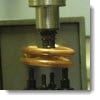 Inserting a piston stop with o-ring into an oil pump assembly
Inserting a piston stop with o-ring into an oil pump assembly
Induction heating provides increased production speed, simpler tooling for customer, hands-free heating that involves no operator skill for manufacturing
 shrink-fitting an assembled wrist pin into a connecting rod
shrink-fitting an assembled wrist pin into a connecting rod
Induction heating provides more accurate control of heat vs a flame burner, it heats only the knuckle, not the whole part, it prevents discoloring due to lower temperature used and increases productivity due to repeatability & ease of operation. A foot pedal & timer is used.
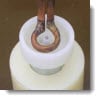 Bonding of electric motor shaft to nylon face fan
Bonding of electric motor shaft to nylon face fan
Induction heating provides hands-free heating that involves no operator skill for manufacturing, only the metal shaft is heated so the motor is not affected, increased production due to rapid heating, decreased failure rate, originally used glue which ran into motor and caused failure and stronger bond
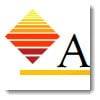 Heating Four Inserts Simultaneously
Heating Four Inserts Simultaneously
The brass inserts are to be heated prior to insertion into a plastic automotive sub assembly
 Case Hardening of Armature Shaft
Case Hardening of Armature Shaft
A five-turn helical coil is used to heat the gear end of the shaft to 1700°F
 Shrink fit a motor shaft and roller
Shrink fit a motor shaft and roller
Processing with induction heat saves power and time. The complete tube does not have to reach the desired temperature as it does when heating with an oven. Being able to selectively heat a zone allows for a much quicker transfer of heat.
Heating is to be accomplished within 5 seconds, and can be done in a helical coil since pick and place manufacturing is employed.
 Bonding Rear View Mirror Brackets to Windshield Glass
Bonding Rear View Mirror Brackets to Windshield Glass
A unique four-over-four double wound pancake coil is used for the bonding application.
 Bonding Automotive Trim Vinyl Covering
Bonding Automotive Trim Vinyl Covering
Heating to 500°F is accomplished through the use of the unique coil; molding is continuously processed at a rate over 20 feet per minute.
 Curing Adhesive on Steel Motor Shaft for Bonding
Curing Adhesive on Steel Motor Shaft for Bonding
A complex two coil system, shield and stud systems used to provide proper axial alignments of the shaft & coil while allowing the fixture to be open for removal of the shaft.
 Pre-heating a Truck Axle Seam for Welding
Pre-heating a Truck Axle Seam for Welding
To pre-heat the seam of a truck axle to over 300°F within 15 seconds for a welding application and maintain temperature within the welding zone
 Heating an Engine Valve Head for Stress Testing
Heating an Engine Valve Head for Stress Testing
To heat the face of an engine valve head to 900°F and maintain the temperature for an extended time, high temperature stress test.
 Brazing Oil Suction Assembly with Copper Ring
Brazing Oil Suction Assembly with Copper Ring
To heat an oil suction assembly (steel tubing and filter cap) to 1,850°F (1010°C) within 15 seconds for a brazing application.
 Shrink Fitting Cam Shaft Gears
Shrink Fitting Cam Shaft Gears
To heat aluminum and steel camshaft gears to over 500°F within 4 minutes for a shrink fitting application.
 Heating Aluminum Auto Trim for Adhesive Curing
Heating Aluminum Auto Trim for Adhesive Curing
To heat various sizes of aluminum auto trim to 500°F (260°C) at a rate of 30 ft. (9.1m) per minute for curing an adhesive.
 Inserting Steel Studs into a Plastic Tail Light
Inserting Steel Studs into a Plastic Tail Light
To heat threaded steel studs for insertion into a plastic tail-light assembly at 450°F.
 Press-Bonding Metal Clips Into Sealers
Press-Bonding Metal Clips Into Sealers
To heat metal clips and press-bond them into rubber seals. The metal needs to be heated to 250°F to 350°F with a cycle time not exceeding 3 seconds
Our Systems for automotive manufacturing with Induction
AMBRELL CORPORATION
1655 Lyell Avenue
Rochester, NY 14606
United States
F: +1 585 889 4030
AMBRELL B.V.
Holtersweg 1
7556 BS Hengelo
The Netherlands
AMBRELL Ltd.
Unit 6, Space Business Centre
Tewkesbury Road
Cheltenham, GLOS, GL51 9FL
United Kingdom
F: +31 546 788 154


 Soldering a Radio Antenna
Soldering a Radio Antenna Soldering Solar Flex Circuits
Soldering Solar Flex Circuits Hardening Seat Belt Parts
Hardening Seat Belt Parts Curing Aluminum Car Molding
Curing Aluminum Car Molding Brass Inserts
Brass Inserts Soldering a Radio Antenna
Soldering a Radio Antenna Soldering Solar Flex Circuits
Soldering Solar Flex Circuits Hardening Seat Belt Parts
Hardening Seat Belt Parts Curing Aluminum Car Molding
Curing Aluminum Car Molding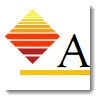 Brass Inserts
Brass Inserts